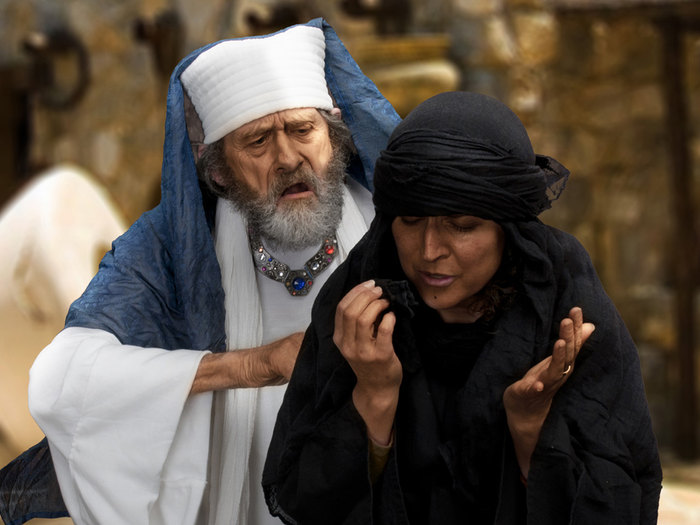Mark 12:38-44 (MSG)
38-40 He continued teaching. “Watch out for the religion scholars. They love to walk around in academic gowns, preening in the radiance of public flattery, basking in prominent positions, sitting at the head table at every church function. And all the time they are exploiting the weak and helpless. The longer their prayers, the worse they get. But they’ll pay for it in the end.” 41-44 Sitting across from the offering box, he was observing how the crowd tossed money in for the collection. Many of the rich were making large contributions. One poor widow came up and put in two small coins—a measly two cents. Jesus called his disciples over and said, “The truth is that this poor widow gave more to the collection than all the others put together. All the others gave what they’ll never miss; she gave extravagantly what she couldn’t afford—she gave her all.”- Nov 8, 2015The Widows
Nov 8, 2015The WidowsBy: Gary HeathSeries: Season of PentecostWidows are visible everywhere in today’s readings. Jesus denounces those scribes who pray impressive prayers but devour widows’ houses. He commends the poor widow who in his view gave far more than the major donors. Jesus doesn’t see her simply as an object of compassion or charity. She, like the widow of Zarephath who shares her last bit of food with Elijah, does something of great importance.1 Kings 17:8-16 (NIV) 8 Then the word of the Lord came to him: 9 “Go at once to Zarephath in the region of Sidon and stay there. I have directed a widow there to supply you with food.” 10 So he went to Zarephath. When he came to the town gate, a widow was there gathering sticks. He called to her and asked, “Would you bring me a little water in a jar so I may have a drink?” 11 As she was going to get it, he called, “And bring me, please, a piece of bread.” 12 “As surely as the Lord your God lives,” she replied, “I don’t have any bread—only a handful of flour in a jar and a little olive oil in a jug. I am gathering a few sticks to take home and make a meal for myself and my son, that we may eat it—and die.” 13 Elijah said to her, “Don’t be afraid. Go home and do as you have said. But first make a small loaf of bread for me from what you have and bring it to me, and then make something for yourself and your son. 14 For this is what the Lord, the God of Israel, says: ‘The jar of flour will not be used up and the jug of oil will not run dry until the day the Lord sends rain on the land.’” 15 She went away and did as Elijah had told her. So there was food every day for Elijah and for the woman and her family. 16 For the jar of flour was not used up and the jug of oil did not run dry, in keeping with the word of the Lord spoken by Elijah.
Mark 12:38-44 (MSG)
38-40 He continued teaching. “Watch out for the religion scholars. They love to walk around in academic gowns, preening in the radiance of public flattery, basking in prominent positions, sitting at the head table at every church function. And all the time they are exploiting the weak and helpless. The longer their prayers, the worse they get. But they’ll pay for it in the end.” 41-44 Sitting across from the offering box, he was observing how the crowd tossed money in for the collection. Many of the rich were making large contributions. One poor widow came up and put in two small coins—a measly two cents. Jesus called his disciples over and said, “The truth is that this poor widow gave more to the collection than all the others put together. All the others gave what they’ll never miss; she gave extravagantly what she couldn’t afford—she gave her all.” - Sep 13, 2015Going Deeper into Discipleship
Sep 13, 2015Going Deeper into DiscipleshipBy: Jennifer FuhrSeries: Season of Pentecost
 This week we hear Mark’s version of Peter’s confession of faith, when Peter
says, “You are the Messiah.” In John, the stumbling block is Jesus’ invitation to eat his flesh, given for the life of the world. In Mark too thes candal has to do with Jesus’ words about his own coming death, and here Peter himself stumbles over Jesus’ words. But Jesus is anointed (the meaning of “messiah”) in Mark only on the way to the cross (14:3); so we are anointed in baptism with the sign of the cross.
This week we hear Mark’s version of Peter’s confession of faith, when Peter
says, “You are the Messiah.” In John, the stumbling block is Jesus’ invitation to eat his flesh, given for the life of the world. In Mark too thes candal has to do with Jesus’ words about his own coming death, and here Peter himself stumbles over Jesus’ words. But Jesus is anointed (the meaning of “messiah”) in Mark only on the way to the cross (14:3); so we are anointed in baptism with the sign of the cross. - May 24, 2015PENTECOST
May 24, 2015PENTECOSTBy: Gary HeathSeries: Season of Pentecost
 Acts 2:1–21A Sound Like a Strong Wind 2 1-4 When the Feast of Pentecost came, they were all together in one place. Without warning there was a sound like a strong wind, gale force—no one could tell where it came from. It filled the whole building. Then, like a wildfire, the Holy Spirit spread through their ranks, and they started speaking in a number of different languages as the Spirit prompted them.5-11 There were many Jews staying in Jerusalem just then, devout pilgrims from all over the world. When they heard the sound, they came on the run. Then when they heard, one after another, their own mother tongues being spoken, they were thunderstruck. They couldn’t for the life of them figure out what was going on, and kept saying, “Aren’t these all Galileans? How come we’re hearing them talk in our various mother tongues?Parthians, Medes, and Elamites; Visitors from Mesopotamia, Judea, and Cappadocia, Pontus and Asia, Phrygia and Pamphylia, Egypt and the parts of Libya belonging to Cyrene; Immigrants from Rome, both Jews and proselytes; Even Cretans and Arabs! “They’re speaking our languages, describing God’s mighty works!” 12 Their heads were spinning; they couldn’t make head or tail of any of it. They talked back and forth, confused: “What’s going on here?” 13 Others joked, “They’re drunk on cheap wine.” Peter Speaks Up 14-21 That’s when Peter stood up and, backed by the other eleven, spoke out with bold urgency: “Fellow Jews, all of you who are visiting Jerusalem, listen carefully and get this story straight. These people aren’t drunk as some of you suspect. They haven’t had time to get drunk—it’s only nine o’clock in the morning. This is what the prophet Joel announced would happen: “In the Last Days,” God says, “I will pour out my Spirit on every kind of people: Your sons will prophesy, also your daughters; Your young men will see visions, your old men dream dreams. When the time comes, I’ll pour out my Spirit On those who serve me, men and women both, and they’ll prophesy. I’ll set wonders in the sky above and signs on the earth below, Blood and fire and billowing smoke, the sun turning black and the moon blood-red, Before the Day of the Lord arrives, the Day tremendous and marvelous; And whoever calls out for help to me, God, will be saved.”
Acts 2:1–21A Sound Like a Strong Wind 2 1-4 When the Feast of Pentecost came, they were all together in one place. Without warning there was a sound like a strong wind, gale force—no one could tell where it came from. It filled the whole building. Then, like a wildfire, the Holy Spirit spread through their ranks, and they started speaking in a number of different languages as the Spirit prompted them.5-11 There were many Jews staying in Jerusalem just then, devout pilgrims from all over the world. When they heard the sound, they came on the run. Then when they heard, one after another, their own mother tongues being spoken, they were thunderstruck. They couldn’t for the life of them figure out what was going on, and kept saying, “Aren’t these all Galileans? How come we’re hearing them talk in our various mother tongues?Parthians, Medes, and Elamites; Visitors from Mesopotamia, Judea, and Cappadocia, Pontus and Asia, Phrygia and Pamphylia, Egypt and the parts of Libya belonging to Cyrene; Immigrants from Rome, both Jews and proselytes; Even Cretans and Arabs! “They’re speaking our languages, describing God’s mighty works!” 12 Their heads were spinning; they couldn’t make head or tail of any of it. They talked back and forth, confused: “What’s going on here?” 13 Others joked, “They’re drunk on cheap wine.” Peter Speaks Up 14-21 That’s when Peter stood up and, backed by the other eleven, spoke out with bold urgency: “Fellow Jews, all of you who are visiting Jerusalem, listen carefully and get this story straight. These people aren’t drunk as some of you suspect. They haven’t had time to get drunk—it’s only nine o’clock in the morning. This is what the prophet Joel announced would happen: “In the Last Days,” God says, “I will pour out my Spirit on every kind of people: Your sons will prophesy, also your daughters; Your young men will see visions, your old men dream dreams. When the time comes, I’ll pour out my Spirit On those who serve me, men and women both, and they’ll prophesy. I’ll set wonders in the sky above and signs on the earth below, Blood and fire and billowing smoke, the sun turning black and the moon blood-red, Before the Day of the Lord arrives, the Day tremendous and marvelous; And whoever calls out for help to me, God, will be saved.” - Nov 4, 2014All Saint’s Sunday
Nov 4, 2014All Saint’s SundayBy: Jennifer FuhrSeries: Season of Pentecost
 Matthew 4:23-5:12
Matthew 4:23-5:12Jesus Heals the Sick
23 Jesus went throughout Galilee, teaching in their synagogues, proclaiming the good news of the kingdom, and healing every disease and sickness among the people. 24 News about him spread all over Syria, and people brought to him all who were ill with various diseases, those suffering severe pain, the demon-possessed, those having seizures, and the paralyzed; and he healed them. 25 Large crowds from Galilee, the Decapolis,[a]Jerusalem, Judea and the region across the Jordan followed him.Introduction to the Sermon on the Mount
5 Now when Jesus saw the crowds, he went up on a mountainside and sat down. His disciples came to him, 2 and he began to teach them.
The Beatitudes
He said:
3 “Blessed are the poor in spirit, for theirs is the kingdom of heaven. 4 Blessed are those who mourn, for they will be comforted. 5 Blessed are the meek, for they will inherit the earth. 6 Blessed are those who hunger and thirst for righteousness, for they will be filled. 7 Blessed are the merciful, for they will be shown mercy. 8 Blessed are the pure in heart, for they will see God. 9 Blessed are the peacemakers, for they will be called children of God. 10 Blessed are those who are persecuted because of righteousness, for theirs is the kingdom of heaven.
11 “Blessed are you when people insult you, persecute you and falsely say all kinds of evil against you because of me. 12 Rejoice and be glad, because great is your reward in heaven, for in the same way they persecuted the prophets who were before you.
- Oct 20, 2013The Parable of the Persistant Widow
